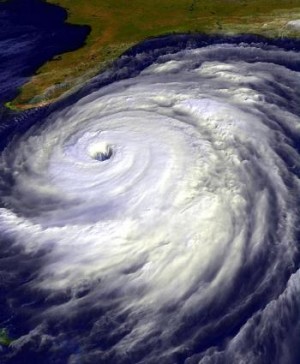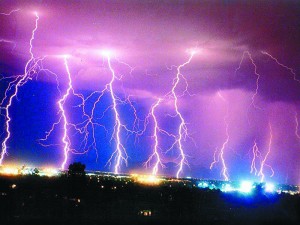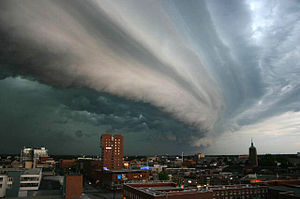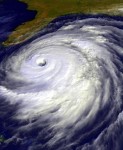This post is based on the Grace Commentary on Jonah. Make sure you sign up for the email newsletter to get a free digital copy of this commentary when it is released.
 In light of the recent storms in various parts of the world and considering some of the storms and natural disasters of the past, it is sometimes asked whether or not God sends these storms, or if they are simply “natural” disasters.
In light of the recent storms in various parts of the world and considering some of the storms and natural disasters of the past, it is sometimes asked whether or not God sends these storms, or if they are simply “natural” disasters.
Some Christians have come out to say that such disasters are God’s judgment upon a nation, a city, or a people for their evil. It is easy to see how these Christians come to such a conclusion, especially when the Bible has several examples of storms and famines sent by God to judge people for their disobedience. God sent fire and brimstone upon Sodom and Gomorrah, the Ten Plagues upon Egypt, and a storm on the ship carrying Jonah.
So it is reasonable to ask whether God sends storms and natural disasters today.
There are four basic answers:
- No, and God never has. The Bible is wrong. God allows these storms, but never sends them.
- No, though God did do this in the past in biblical times, He doesn’t do this any longer.
- Yes, God is in control of everything, and so all storms and weather patterns are a result of His perfect will.
- Yes, God can send storms, but He usually doesn’t, and there is no way to be certain today which storms are divinely sent and which ones are just a result of natural weather patterns. However, God can use all storms to call people back to Himself.
I reject option 1 because I do not believe the Bible contains errors. The Bible says that God sent various storms in Biblical times, and I am not comfortable saying that the Bible is wrong.
I reject option 2 because I do not believe that the character of God changes, and if He sent storms in the past, but does not do so any longer, it would seem that the only reason is because He had a change in His character. I cannot accept that.
I also reject option 3 because to me, it is theologically repugnant. I cannot accept the idea that God sends all storms, hurricanes, tornadoes, famines, earthquakes, tsunamis, and a host of other disasters which kill thousands of people, causes terrible destruction, and leads to massive sickness and sadness.
But if I reject option 3, it seems that I must also reject option 4. If it is not theologically acceptable to say that God sends all storms, isn’t it just as unacceptable to say that God sends some? I mean, most storms cause devastation, death, and destruction, so if God sends some storms, isn’t He causing some of these things?
So where does that leave me? I am seriously considering a 5th option, which is a cross between option 1 and option 4.
Christ-Centered Reading of Scripture
 This options states that while God can send storms, He usually doesn’t—not in our day or in biblical times. When the Bible states that God sent a storm, it is actually stating the human author’s opinion that God sent the storm, but not the actual fact that He did. This helps maintain the accuracy of Scripture, in that it accurately reflects the ideas and views of people who lived at that time, but it enables the reader to understand that because of what we see in Jesus, God does not behave the way people thought He did.
This options states that while God can send storms, He usually doesn’t—not in our day or in biblical times. When the Bible states that God sent a storm, it is actually stating the human author’s opinion that God sent the storm, but not the actual fact that He did. This helps maintain the accuracy of Scripture, in that it accurately reflects the ideas and views of people who lived at that time, but it enables the reader to understand that because of what we see in Jesus, God does not behave the way people thought He did.
Such a view is a “Christological” reading of Scripture. This view maintains the historical accuracy of the Gospel accounts, thereby allowing the life, teachings, miracles, parables, and actions of Jesus to be the guiding principle in understanding the rest of Scriptures. When a passage of Scripture does not match up with Jesus of the Gospels, Jesus trumps what we read in other passages. This does not mean that these other passages are wrong, but that they might more accurately reflect what people thought about God, but were wrong.
In this view, when we look at Jesus, we only see Him calming storms, never sending them. When we look at Jesus, we only see Him feeding the hungry, never sending famines. When we look at Jesus, we never see Him calling down fire upon His foes, but only rebuking His disciples when they ask Him to incinerate those who reject Him. And on and on it goes. If Jesus reveals the Father to us, and is the exact representation of God, then Jesus shows us how God behaves. Portrayals of God in the Old Testament which contradict how Jesus represents God to us are inerrant portrayals of what people thought God was like, but are not inerrant portrayals of what God is actually like.
Such a view is appealing, until we actually try to apply it to some Old Testament texts. For example, God tells Noah to build an ark because He is going to send a flood upon the entire earth. This view would supposedly argue that since Jesus does not send floods, God does not send floods, so the flood in Genesis 6 was not sent by God. What then do we do with Genesis 6?
Or take Joshua and the battle of Jericho. After marching around the city according to God’s instructions, the walls fell down and killed most of the residents of Jericho. It wasn’t exactly a storm that caused the walls to fall down, but since Jesus never killed anyone by having a wall fall on them, are we to say that God did not actually give Joshua these instructions? If not, then why did Joshua do this, and how did the walls falls down?
We could talk about the Ten Plagues, the parting of the Red Sea, the conquest of Canaan, Gideon’s victory over the Midianites, the storm that God sent upon the wayward Jonah, and so on. If Jesus it the guiding interpretive principle for these Old Testament texts, then we must say that in every one of these cases, God did not actually give the instructions the Israelites that are recorded in the Bible, and if that is the case, then where did the instructions come from and what actually happened in these events? Must we simply chalk them up to myth? I am not ready to do that.
A Sixth Option?
 I have another theory percolating in the muddy recesses of my mind. I have discussed it only with my wife, Wendy, and she says that of all the theories, it makes the most sense. But since I have not read this theory anywhere else, and have not sincerely thought through the ramifications of this theory, I am not ready to share it.
I have another theory percolating in the muddy recesses of my mind. I have discussed it only with my wife, Wendy, and she says that of all the theories, it makes the most sense. But since I have not read this theory anywhere else, and have not sincerely thought through the ramifications of this theory, I am not ready to share it.
Until then, it seems best to conclude that in some way or another, God does send storms. From the entire testimony of Scripture, this seems to be the safest option, the one accepted by most people throughout time, and the one least likely to get us branded as a heretic. If you are interested in reading about this topic more, here are some books I recommend. I am not saying I agree with what is written in these books, only that they have raised some of these questions I am asking above, and have made me think.
- Is God to Blame?
by Greg Boyd
- Is God a Moral Monster?
by Paul Copan
- God’s Word in Human Words
by Kenton Sparks
- The Bible Made Impossible
by Christian Smith
- Disturbing Divine Behavior
by Eric Seibert
- The Human Faces of God
by Thom Stark
- Reading the Bible Again For the First Time
by Markus Borg
Other than these, are there other books you have read which deal with the difficult question of the God of the Old Testament behaving in ways which seems contrary to the God revealed in Jesus Christ?
And what do you think of these debates? Does God send storms, famines, and earthquakes? If so, how do you reconcile this with the nature and character of God revealed in Jesus Christ?
This post is based on the Grace Commentary on Jonah. Make sure you sign up for the email newsletter to get a free digital copy of this commentary when it is released.




for me, God’s purposes are for good and He is good. He restores things from within and does not act from without. His purposes are made manifest in the response to disasters. He is our refuge and comfort
Yes, all this is true. But does God send rape, murder, incest, and other such horrors?
no, He categoically doesn’t. God is not capable of evil
Absolutely true!
in the OT, storms happen…. maybe it’s a question of how the propht in question interprets them in the context of his whole narrative. From what Jesus says, i think we can only say that storms, whether literal or metaphorical, are inevitable. When the disciples panicked on the boat, He said “you of little faith”. He didn’t stop the storm to illustrate this. It’s more something that was needed in the midst of the storm. Through storms, I believe we become closer to Jesus as we share His consolation and allow him to be our strength when we are weak
Great insight into storms. Storms are inevitable, and rather than sending them upon us, Jesus rides through them with us.
This is not right at all. The Bible Is never wrong. All scripture is inspired by God The Father.
Jonah was in disobedience which opens wide the devil to do as he pleases . God saved him from drowning by having the great fish swallow him. Storms are not from God. Obedience keeps you safe in Gods loving arms. When rape, murder etc. happens it hurts Him as well as it hurts us. We are made after him. If you stay in obedience to His word ( Bible) you and your family can be totally free from these evils. It’s NOT His will that any should have pain and suffering, Jesus took all on the cross so we don’t have to. Poverty too!
Don’t just read scripture study it. Don’t take my word for it or this person that wrote this article, study Gods word He will show you the real truth.
I absolutely agree. Praise God for the truth will set you free.
Dear Jeremy,
Thanks for writing about this issue of “storms”. I am on a journey with this whole phenomenon and am searching for answers. I agree with you 100% that our Father does not and did not send storms, but am struggling with some of the same scriptures that you mention. Here is where I am wondering if we have missed something: the curse. Could it be that when Adam sinned and the curse fell on the Earth, that now all of the enviroment that we live in is still under that curse, and when I insist on my way rather than Father’s way, that I subject myself to the forces of nature rather than Father’s protection?
Seeking, VB
Hm. Good question. I think that one of the things Jesus accomplished on the cross was to life and reverse the curse. However, reversing the curse is not the same as removing it or it’s effects. I do think that we still experience effects of the curse.
So yes, when we insist on our own way, I think He protects us for a while from our poor decisions, but eventually, He gives us over to our willful rebellion, and lets the effects of the curse and the destructive forces have their way in our lives.
What are your thoughts?
Your fourth option doesn’t make sence to me and seems weak. Why would it have to theologically unacceptable for some storms to be from God just because it is theologically unacceptable to say all are from God? That almost sounds like a politically correct attempt to be fair and balanced with the weather patterns. It’s clear and therefore theologically acceptable that storms and will be released from God as a consequence of not keeping His command: Deut. 28:24, etc. that’s a massive haboob He’s talking about there.
I think destructive storms do come as a consequence of not obeying God, but I don’t think that God Himself actively sends them.
Okay, besides the whole flood event which God orchestrated, I think you’d have to come to a decision if God is truly sovereign over everything he has created. If not, then how can we fully trust that our salvation is safe with Him and no power can take it away from Him. satan had to ask permission to torment Job and kill his children. Proving that if God doesn’t sanction disasters they wouldn’t happened. Verses to consider – Isa. 45:7, Rom. 6:20, 2 Chron. 7:13, Amos 3:6 . . just to name a few. I’m sure anyone can google and come up with more. God has to be more powerful than anyone and any force to be a truly “All-powerful” and sovereign god worth having faith in.
Jeremy i think satanic forces is more likely in that particular storm with Jesus and his disciples in the boat that was to test his disciples faith and they failed the test.Jesus rebuked the storm there was a power that was out to destroy them why else would he rebuke it maybe he was waiting foir them to rebuke it themselves they had prayed for people and seen healing they had commanded evil spirit to come out of people so they were aware of the power of God.Yet they were in fear of there lives faithless and afriad.Paul on his way to rome was caught in a storm and through an angel paul was told many would die Paul interceeded for the crew and lives on board and God promised that all would be spared.Paul had warned them before the voyage that it would end in disaster but they did not listen.Satan wasnt happy with that plan because he had hoped to kill as many people as possible there was over 300 souls on board and many had been expected to die.So satan attempted to kill Paul and he was bitten by a snake but satan is no match for Jesus Christ he has been defeated and so Paul lived and continued to preach the gospel was many being saved.brentnz
Or #4 The revelation of Jesus the peacemaker, trumps all OT understanding and teachings of a God who steals, kills, and destroys. The old is gone, the new as come. This requires a new wine skins.